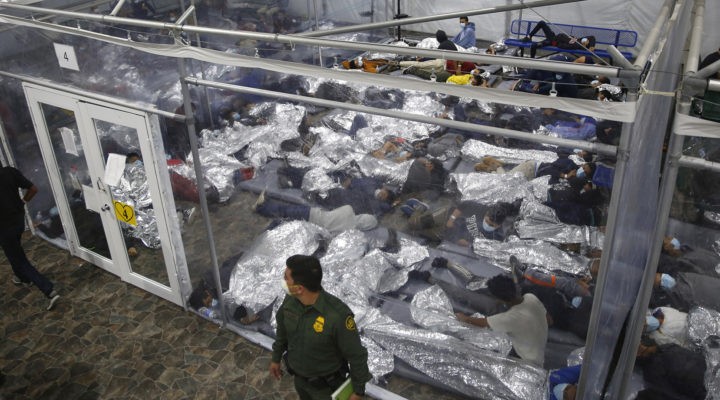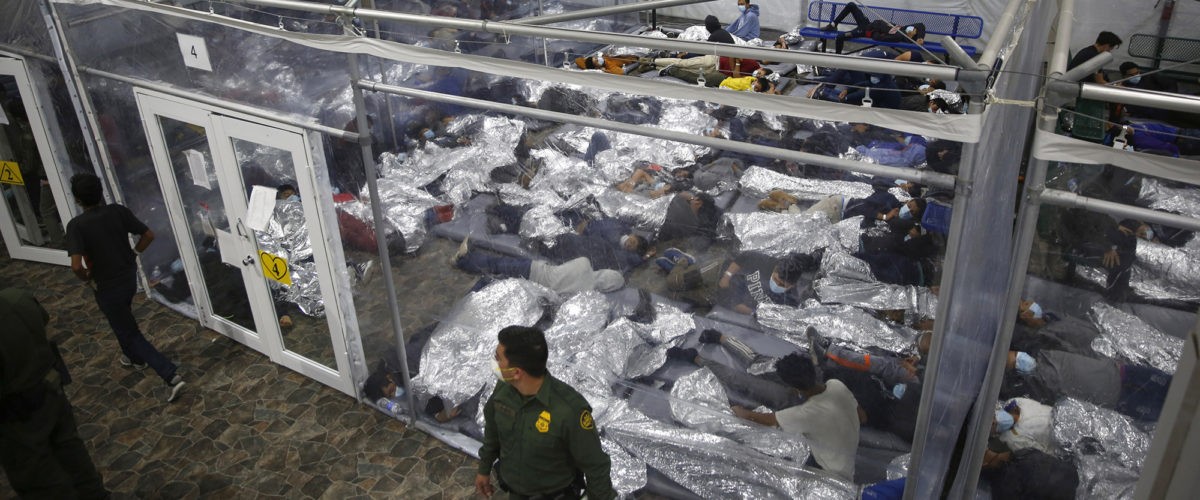Caring for the well-being of the most vulnerable children among us should be an easy decision for people of faith. The church already knows the importance of its sacred calling to care for children, taking seriously the stark biblical warning found in Luke 17:2 — “It would be better for you if a millstone were hung around your neck and you were thrown into the sea than for you to cause one of these little ones to stumble.”
So perhaps there is no need for an opinion article like this one that calls attention to the fact that hundreds of children contracted COVID in the overcrowded conditions of the Department of Health and Human Services migrant shelter in Fort Bliss, Texas.

Kathy Manis Findley
In a complaint filed Wednesday, July 28, two whistleblowers revealed several areas of child maltreatment present in the Texas shelter. The whistleblowers, Arthur Pearlstein and Lauren Reinhold, are federal employees who volunteered to be assigned to the shelter when the Biden administration increased staffing to help with the growing problem of unaccompanied children crossing the border. They reported that the 5,000-plus children were living in dangerously overcrowded conditions and that Department of Health and Human Services employees told them to minimize the fact that hundreds of children held in the shelter have contracted COVID.
Then they revealed several other instances of maltreatment. The children did not consistently have adequate masks, and the shelter did not enforce mask wearing. Unqualified staff were caring for the children. There were serious outbreaks of lice. The children did not have clean underwear. Staff with no experience in clinical assessment or child psychology assessed more than 5,000 children to determine if they were at increased risk due to a history of abuse or exposure to trafficking.
An article published by NBC News exposed what is possibly the most egregious instance of maltreatment. The whistleblowers said in their complaint that contract staff gave children false hopes of reuniting with family members and often pulled them back at the last minute, even taking children out of lines for buses and pulling them out of airplanes before takeoff. Treating children in this manner could plunge them into depression, anxiety and post-traumatic stress responses, even culminating in the extreme behavior of self-harm or suicide.
“The children did not have clean underwear.”
Enough of the cold facts. The hard reality is that reports of unconscionable maltreatment of migrant children can be found everywhere.
- “The federal government received more than 4,500 complaints in four years about the sexual abuse of immigrant children who were being held at government-funded detention facilities.” The New York Times
- “At a U.S. border detention center in the Texan desert, migrant children have been living in alarming conditions — where disease is rampant, food can be dangerous and there are reports of sexual abuse.” BBC News
- There are multiple legal claims that children are exposed to emotional, physical and sexual abuse in U.S.-funded foster homes for migrant children. AP News
How do people of faith advocate for children who are in hopelessly cruel situations? First, we need to understand the meaning of the verb “advocate” in its fullest sense. The church seldom uses “advocate” to describe its ministry. Some of the synonyms for advocate? Defend, fight for, encourage, champion, vindicate, stand up for, plead for.
“The church seldom uses ‘advocate’ to describe its ministry.”
Those active verbs and phrases describe exactly what people of faith must be about, especially on behalf of children. Not just our own children, but all children. Yet, advocate is not a verb we often use or understand. It is a child-protection term, actually, widely used to describe work on behalf of abused, neglected or maltreated children.
Certainly, people of faith pray often for such children, holding them in hearts of Christ- like compassion. This holy act of prayer and compassion always will be important. But we can do better and do more in fulfilling our mission of Christ-like compassion when we remember that Jesus cared for people and children on the margins. Having compassion for these children may mean taking different pathways and looking at different ways of care.
My ministry led me from a nine-year pastorate to the world of advocacy for victims of abuse, particularly abused and trafficked children. In the 10 years that followed, I led a staff of 15 professional advocates and at least 50 volunteer advocates. Together, we provided a range of services, including emotional support, therapy, family support, trauma counseling, hospital presence, court advocacy and violence prevention education. All of it was called advocacy, and that’s when I discovered that the verb in its purest form means being a compassionate presence with the most damaged, broken people, especially children.
People of faith can be “holy advocates” for children who desperately need care. There are so many ways to do that.
“People of faith can be ‘holy advocates’ for children who desperately need care.”
We can do it by keeping ourselves aware of the plight of migrant children entrusted to the care of the United States government.
We can do it by contacting our congressional representatives and the United States president demanding compassionate action on behalf of these children.
We can advocate for children by volunteering with organizations committed to protecting migrant children, as well as children in other desperate situations.
There are multiple ways people of faith can advocate, care for, the most vulnerable children among us. There are ministries of compassion that we never have thought of or considered before, creative ministries beyond our usual sphere that will require us to broaden the breadth of what we’re used to. Will we dare to reach further, stretch, extend, imagine, create, dream?
Dream!
Those whose dream of helping create a world where children are safe, loved, cared for — and never harmed — will find pathways to realize that dream. Because God would delight in it. Because Jesus would lead us in his own footsteps of compassion. Because the Spirit would energize us with Spirit-wind.
What a perfect mission for people of faith — being holy advocates who care for the most vulnerable children. I challenge all people of faith to consider a new mission on behalf of children who are harmed. I challenge all of us to make sure children are not irreparably harmed.
May God find us doing this work of compassion, reaching beyond ourselves toward such a holy dream.
Note: If you are interested in exploring volunteer advocacy with abused, neglected or maltreated children, there are many organizations that need you. One of the best is National Court Appointed Special Advocates.
Kathy Manis Findley is an ordained Baptist minister with Greek Orthodox roots. Now retired in Macon, Ga., she spent her 38-year ministry serving as a pastor, hospital chaplain, trauma counselor and missionary to Uganda. She is a graduate of Southern Baptist Theological Seminary and is certified in victimology, trauma intervention and child forensic interviewing. She is the author of two serious books, Voices of our Sisters and The Survivor’s Voice: Healing the Invisible Wounds of Violence and Abuse, and just for fun, one Kindle novel.
Related articles:
Religious groups oppose Texas governor’s attempt to shut down migrant shelters
Report says Trump administration lied about immigrant parents wanting to leave children behind
Christian advocacy puts words and actions together in following God | Opinion by Chris Ellis


